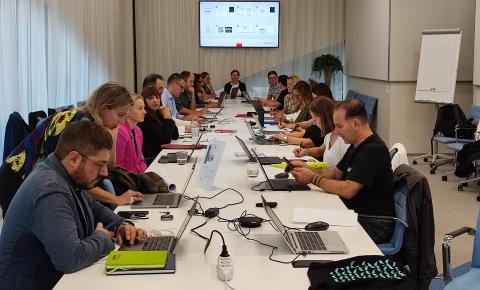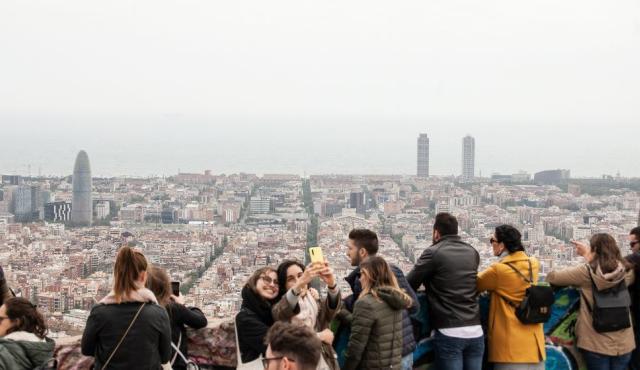News
About the partnership
"The Sustainable Tourism Partnership is committed to advancing tourism that respects and preserves cultural heritage, promotes environmental responsibility, and supports local communities and economies."
Initiated in December 2022 under the Urban Agenda for the EU, the Sustainable Tourism Partnership unites 29 members, including 9 cities, 3 regions, and 1 national authority, to address the pressing challenges of tourism development. Its mission is to support tourism policies and practices that balance economic growth with environmental protection and social well-being, contributing to the sustainability of tourism destinations across Europe.
Aligned with broader EU tourism and sustainability objectives, the Partnership promotes tourism that respects local culture, reduces environmental impact, and enhances the quality of life for residents and visitors alike. Working across governance levels, the Partnership contributes to the development and implementation of policies that support sustainable tourism.
Thematic focus
The Sustainable Tourism Partnership is structured around four working groups (WGs), each addressing a key component of sustainable tourism. The Partnership’s thematic focus is rooted in the following core areas to ensure tourism’s positive impact on the environment, development, and economy, contributing to the three UAEU pillars: Better Knowledge, Better Funding, and Better Regulation.
TOPIC 1 – Destination Resilience and Climate Adaptation
Tourism destinations are increasingly vulnerable to climate change impacts, which threaten their long-term viability. This WG works on strategies to enhance climate resilience in tourism destinations by promoting climate adaptation measures, disaster risk reduction, and ecosystem protection. This includes developing guidance and tools for local authorities to support climate-adaptive tourism destinations and capacitating tourism sector SMEs towards sustainability certifications.
TOPIC 2 – Digital Skills and Competence Development
The shift toward digitalisation is transforming tourism, requiring new skills to enhance service quality, sustainability, and competitiveness. This WG focuses on building digital competencies for tourism professionals and local authorities fostering innovation and supporting adaptation to digital tools. By promoting training initiatives and resources, it aims to equip stakeholders with the skills needed to leverage digital solutions, improve customer experiences, and optimise destination management.
TOPIC 3 – Addressing Unbalanced Growth
Rapid tourism growth can lead to uneven development, placing strain on certain destinations while others remain underutilised. Through targeted strategies and resource distribution, the WG aims to promote sustainable growth, reduce pressure on overcrowded destinations, promote accessibility and enhance the attractiveness of lesser-known areas. This approach supports a more equitable and sustainable tourism landscape, benefiting both popular and emerging destinations.
TOPIC 4 – Supporting Local Economies and Retail
Sustainable tourism thrives when it bolsters local economies and supports small businesses. This WG is dedicated to enhancing the connection between tourism and local commerce, promoting practices that benefit local retailers and service providers. By fostering collaboration between tourism stakeholders and the local economy, this WG aims to contribute to a tourism model that not only attracts visitors but also uplifts local communities and sustains small enterprises for long-term resilience.
Tourism destinations are increasingly vulnerable to climate change impacts, which threaten their long-term viability. This WG works on strategies to enhance climate resilience in tourism destinations by promoting climate adaptation measures, disaster risk reduction, and ecosystem protection. This includes developing guidance and tools for local authorities to support climate-adaptive tourism destinations and capacitating tourism sector SMEs towards sustainability certifications.
The shift toward digitalisation is transforming tourism, requiring new skills to enhance service quality, sustainability, and competitiveness. This WG focuses on building digital competencies for tourism professionals and local authorities fostering innovation and supporting adaptation to digital tools. By promoting training initiatives and resources, it aims to equip stakeholders with the skills needed to leverage digital solutions, improve customer experiences, and optimise destination management.
Rapid tourism growth can lead to uneven development, placing strain on certain destinations while others remain underutilised. Through targeted strategies and resource distribution, the WG aims to promote sustainable growth, reduce pressure on overcrowded destinations, promote accessibility and enhance the attractiveness of lesser-known areas. This approach supports a more equitable and sustainable tourism landscape, benefiting both popular and emerging destinations.
Sustainable tourism thrives when it bolsters local economies and supports small businesses. This WG is dedicated to enhancing the connection between tourism and local commerce, promoting practices that benefit local retailers and service providers. By fostering collaboration between tourism stakeholders and the local economy, this WG aims to contribute to a tourism model that not only attracts visitors but also uplifts local communities and sustains small enterprises for long-term resilience.
We invite you to explore the Miro-board embedded below to view the Sustainable Tourism Action Plan at a glance.
Members
By clicking on the symbol , in the top left corner, you will be able to see the different layers of this map.
National authorities
- Ministry of Economics and Communication of Estonia (EE)
Regions
- Andalusia Ministry of Tourism, Culture and Sport (ES)
- Comunidade Intermunicipal da Região de Coimbra - CIMRC (PT)
- Rhine-Neckar Region Association (DE)
Cities (Urban Authorities)
- Municipality of Genoa, Coordinator (IT)
- Municipality of Galati, Coordinator (RO)
- City of Porvoo (FI)
- City of Venice (IT)
- City of Šibenik (HR)
- City of Zadar (HR)
- Municipality of Heraklion (EL)
- Municipality of Larissa (EL)
- Narva City Government, Department for City Development and Economy (EE)
European/ national city umbrella organisation
- Eurocities (BE)
- ICLEI European Secretariat (DE)
Other stakeholders
- Association for the Promotion of Tourism in Oradea and the Region (Visit Oradea)-APTOR (RO)
- Diputació de Barcelona (Barcelona Provincial Council) (ES)
- Fundació Visit València (ES)
- Ljubljana Tourism (SI)
- Mirabilia Network (IT)
- visit.brussels (BE)
European institutions
- European Commission Directorate-General for Regional and Urban Policy (DG REGIO)
- European Commission Directorate-General for Employment, social affairs and inclusion (DG EMPL)
- European Commission Directorate-General for Internal Market, Industry, Entrepreneurship and SMEs (DG GROW)
- European Commission Directorate-General for Climate Action (DG CLIMA)
- European Commission Secretariat-General
- European Commission Directorate-General for Maritime Affairs and Fisheries (MARE)
- European Commission DG Directorate-General for Education, Youth, Sport and Culture (EAC)
- European Commission Joint Research Centre (JRC)
Documents
EUI - Call for City-to-City Exchanges
The call for City-to-City exchanges is open on a continous basis.
Check the details and apply to benefit of other city experiences to tackle your sustainable urban development challenges.
Knowledge
View knowledge outputs on Portico
Portico is the European urban knowledge platform developed by the European Urban Initiative (EUI) in support of better urban policy and strategy design, implementation, and mainstreaming.
Updated on 2 years 4 months ago




